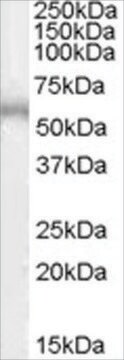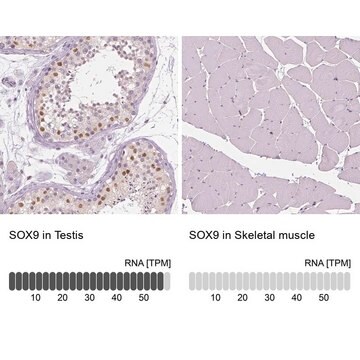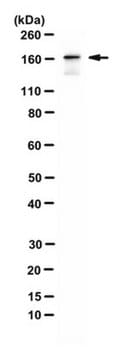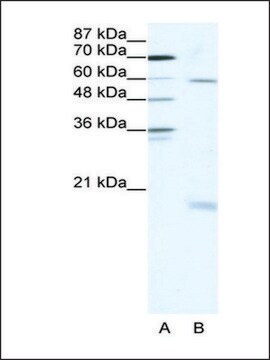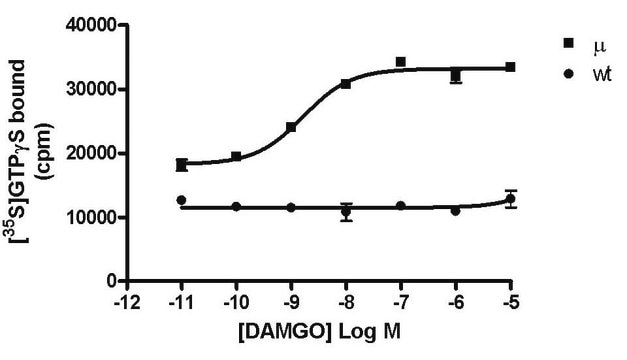AB9680
Anti-GABA A Receptor β 1 Antibody
Chemicon®, from rabbit
Sign Into View Organizational & Contract Pricing
All Photos(1)
About This Item
UNSPSC Code:
12352203
eCl@ss:
32160702
NACRES:
NA.41
Recommended Products
biological source
rabbit
Quality Level
antibody form
affinity purified immunoglobulin
antibody product type
primary antibodies
clone
polyclonal
purified by
affinity chromatography
species reactivity
human, rat, mouse
manufacturer/tradename
Chemicon®
technique(s)
western blot: suitable
NCBI accession no.
UniProt accession no.
shipped in
dry ice
target post-translational modification
unmodified
Gene Information
human ... GABRB1(2560)
Specificity
GABAA Receptor beta 1 subunit. The antibody recognizes a protein of ~55 kDa corresponding to GABAA Receptor beta 1 subunit in lysates from rat cerebellum and cortex.
Immunogen
Fusion protein from the Cytosolic loop of rat the GABAA Receptor beta 1 subunit.
Application
Research Category
Neuroscience
Neuroscience
Research Sub Category
Neurotransmitters & Receptors
Neurotransmitters & Receptors
This Anti-GABA A Receptor β 1 Antibody is validated for use in WB for the detection of GABA A Receptor β 1.
Western blot: 1:1,000.
Optimal working dilutions must be determined by the end user.
Optimal working dilutions must be determined by the end user.
Linkage
Replaces: AB5451
Physical form
Affinity purified immunoglobulin. Liquid in 10 mM HEPES (pH 7.5), 150 mM NaCl, 100 μg/mL BSA and 50% glycerol.
Storage and Stability
Maintain at -20°C in undiluted for up to 6 months after date of receipt. Avoid repeated freeze/thaw cycles. Do not store in a self defrosting freezer.
Legal Information
CHEMICON is a registered trademark of Merck KGaA, Darmstadt, Germany
Disclaimer
Unless otherwise stated in our catalog or other company documentation accompanying the product(s), our products are intended for research use only and are not to be used for any other purpose, which includes but is not limited to, unauthorized commercial uses, in vitro diagnostic uses, ex vivo or in vivo therapeutic uses or any type of consumption or application to humans or animals.
Not finding the right product?
Try our Product Selector Tool.
Storage Class
10 - Combustible liquids
wgk_germany
WGK 2
Certificates of Analysis (COA)
Search for Certificates of Analysis (COA) by entering the products Lot/Batch Number. Lot and Batch Numbers can be found on a product’s label following the words ‘Lot’ or ‘Batch’.
Already Own This Product?
Find documentation for the products that you have recently purchased in the Document Library.
Alejandra Cabello-Arreola et al.
Genes, 11(3) (2020-03-04)
Suicide is a major public health concern; nevertheless, its neurobiology remains unknown. An area of interest in suicide research is the dorsolateral prefrontal cortex (DLPFC). We aimed to identify altered proteins and potential biological pathways in the DLPFC of individuals
S Hossein Fatemi et al.
Journal of autism and developmental disorders, 40(6), 743-750 (2010-01-13)
We have shown altered expression of gamma-aminobutyric acid A (GABA(A)) and gamma-aminobutyric acid B (GABA(B)) receptors in the brains of subjects with autism. In the current study, we sought to verify our western blotting data for GABBR1 via qRT-PCR and
S H Fatemi et al.
Translational psychiatry, 3, e303-e303 (2013-09-12)
There is abundant evidence that dysfunction of the γ-aminobutyric acid (GABA)ergic signaling system is implicated in the pathology of schizophrenia and mood disorders. Less is known about the alterations in protein expression of GABA receptor subunits in brains of subjects
S Hossein Fatemi et al.
Synapse (New York, N.Y.), 71(7) (2017-03-21)
Schizophrenia and bipolar disorder are complex psychiatric disorders that affect millions of people worldwide. Evidence from gene association and postmortem studies has identified abnormalities of the gamma-aminobutyric acid (GABA) signaling system in both disorders. Abnormal GABAergic signaling and transmission could
Our team of scientists has experience in all areas of research including Life Science, Material Science, Chemical Synthesis, Chromatography, Analytical and many others.
Contact Technical Service